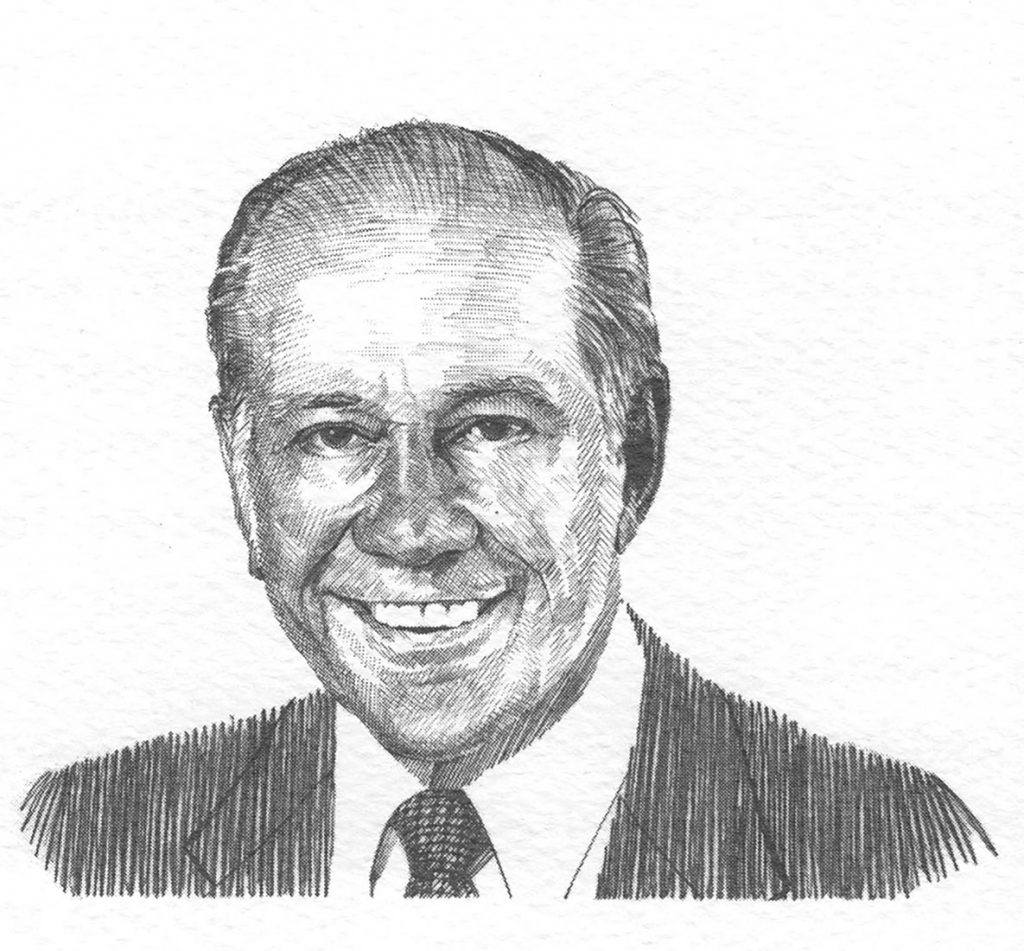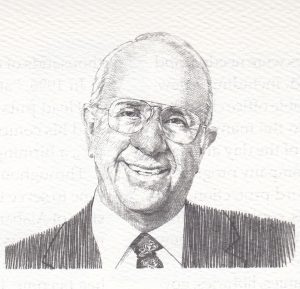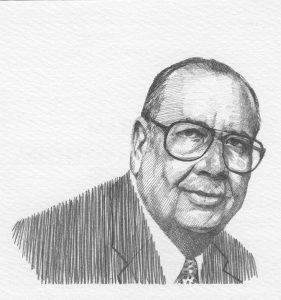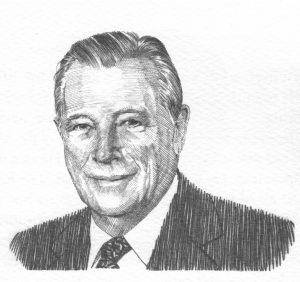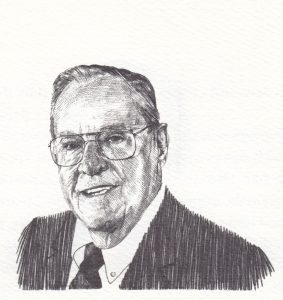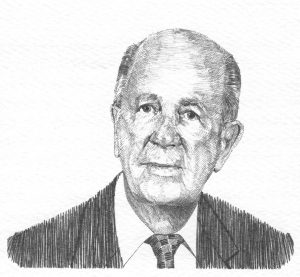No man has been more aptly named than Edward M. Friend, Jr. General Friend, as he was proud to be called, was a friend to, and a friend of, everyone. His civic and philanthropic endeavors on the part of Birmingham and Alabama are legendary. And his military service was an inspiration to a grateful nation.
General Friend was born in Birmingham on May 1, 1912, the son of Edward M. and May Gusfield Friend. He attended South Highland Grammar School in Birmingham and graduated from Phillips High School. He attended The University of Alabama where he graduated in 1933, receiving a commission as a second lieutenant in the infantry reserve. He earned his law degree at Alabama in 1935 and returned to Birmingham to practice law. Three years later, he married Hermione Curjel, a union that would last for 58 years, and produce two children, Edward M. Friend III, and Ellen Friend Elsas.
In 1941, he went on active military duty, launching what would become an exemplary military career. He expected to complete a one-year tour of duty and return to his law practice. Those expectations ended with Japan’s attack on Pearl Harbor. His military outfit moved to California where he attended desert training and general staff school. In 1943 he was ordered to North Africa to participate in the invasion of Sicily with the Second Army commanded by General Omar Bradley. General Friend returned to the United States later that year but left shortly thereafter on the Queen Mary for England to prepare for the Normandy invasion.
General Friend landed at Utah Beach on June 7, and his unit, the Seventh Corps, participated in the capture of Cherbourg, the breakthrough at St. Lo, the Battle of the Bulge, and finally, the invasion of Germany where his unit met the Russians near Leipzig.
General Friend earned several military decorations during the war. He received the Legion of Merit with Cluster, the Croix de Guerre with Palm, the European Campaign Ribbon with seven battle stars and the bronze arrowhead for the landing in Normandy, and the Outstanding Civilian Service Medal.
He eventually was reassigned to the Pentagon and released from active duty as a full colonel. He was on active duty for five years, and served another 26 years in the Army Reserve, attaining the rank of Brigadier General. In his final days, he was named a Major General in the Alabama National Guard and was honored with a proclamation of General Edward Friend Day throughout the state.
Following his World War II service, General Friend resumed his law practice. In 1945 he joined Morris Sirote, Jimmy Permutt, and Karl Friedman to found the law firm now known as Sirote and Permutt, one of the largest law firms in the state with more than 100 attorneys.
He took the role of the firm’s “rainmaker,” a lawyer who through his ability and personality attracts substantial and diverse clients to his firm. The four founders of the firm remained close friends throughout their lives.
While General Friend had many interests, he had a true passion for the law. He was one of the country’s great lawyers and specialized in the field of tax law and corporate and estate planning.
General Friend’s effective advocacy and keen intellect earned him a well-deserved reputation as a leader in the Bar. His strong interest in legal education and in the improvement of his profession earned him several honors. He was named Outstanding Alumnus at the School of Law at The University of Alabama, which, along with Birmingham-Southern College, awarded him an honorary Doctor of Laws degree. He was named Lawyer of the Year, served as president of the Birmingham Bar Association, and as president of the University of Alabama Law School Foundation. He founded the Legal Aid Society in Birmingham, which provides legal help to those unable to afford a lawyer. He also was heavily involved in helping young lawyers develop their legal skills and impressed upon them the need to provide their clients with their best efforts.
General Friend derived immense satisfaction from community service. He served as president of the Birmingham Jewish Foundation, the Family Counseling Association, the Birmingham Area Council of the Boy Scouts of America (which presented him the Silver Beaver Award, its most prestigious honor), the Downtown Rotary Club, and the Metropolitan Arts Council. He was chairman of the 1982 United Way campaign at a time of high unemployment and the closing of U.S. Steel, formerly the campaign’s largest contributing unit. He led the campaign to what many said was an unbelievable success that resulted in Birmingham being highlighted nationally as one of ten cities in the “Winner’s Circle.”
He chaired the Alabama Bar Association’s Committee for the Study of Correctional Institutes and Procedures and was co-chairman of the Human Rights Committee appointed by the federal courts to deal with Alabama’s prison system.
He served as chairman of the President’s Cabinet of The University of Alabama and served on the boards of the Children’s Hospital, the Greater Birmingham Foundation, the Red Cross, the Birmingham Metropolitan Area Chamber of Commerce, the Lakeshore Foundation, Jewish Family Services, and many other organizations.
He was honored as Birmingham’s Man of the Year in 1983, named Outstanding Civic Leader by the Fund-Raising Executives, inducted into the Alabama Academy of Honor, and received the Brotherhood Award from the National Conference of Christians and Jews. Throughout his life, General Friend worked to improve race relations in his city, his state, and his country.
Upon his death in 1995, several resolutions were adopted recognizing his many contributions to his community. A resolution adopted by the City Council of Birmingham recognized his outstanding generosity. A resolution by The Executive Committee and Advisory Board of the Birmingham Area Council of the Boy Scouts of America recognized his heroism, saying that General Friend” constantly reflected the values that make heroes – courage, optimism, intelligence, tolerance, and stamina.”
General Friend was a collector of quotes, and one of his favorites was this one from Leo Rosten, the writer: “The purpose of life is to matter, to be productive, to have it make some difference that you lived at all. Happiness, in the ancient, noble verse, means self-fulfillment and is given to those who use to their fullest whatever talents God, or luck, or fate bestowed upon them.”
Edward M. Friend, Jr., by all accounts, more than fulfilled his purpose in life, for he indeed mattered greatly.

